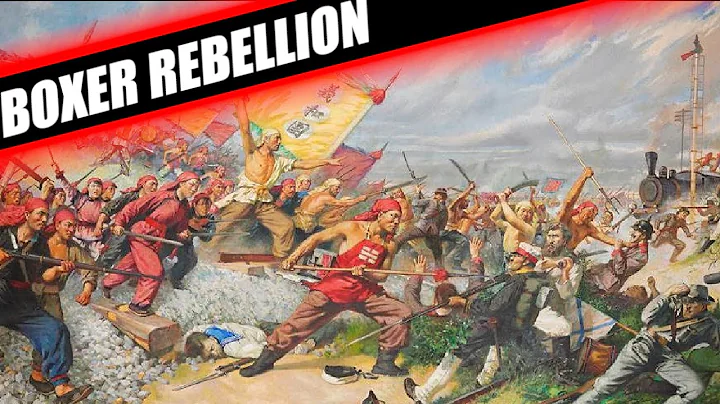
Emperor Daoguang
Hello everyone, I am Lantai.
Today Lantai will introduce to you the Battle of Zhenjiang, which caused the most significant losses to the British army during the First Opium War.
The Battle of Zhenjiang was the last battle against the British army in the First Opium War, and it was also the battle that caused the greatest casualties to the British army in the entire war.
Before the Battle of Zhenjiang , the city's defenders, namely the Eight Banners of Jingkou and the Eight Banners of Qingzhou, had only 1,600 people, led by Hai Ling, while the number of British troops amounted to 6,905, in addition to hundreds of naval forces.
After learning that the British army wanted to attack Zhenjiang, the Qing army also sent reinforcements. On July 13, 16, and 19, 1842, a total of 2,800 people arrived in three batches. They were led by Sichuan Admiral Qishen and were stationed outside the city. Niu Jian, the governor of Liangjiang, visited Zhenjiang in person on the 13th, but left for Nanjing the next day.
is equal to the total strength of the Qing army in the Battle of Zhenjiang, which was 4,400, while the British army had 7,000. It was a true battle of numbers against numbers.
On July 20, 1842, the entire British army was assembled, and the siege officially started on the 21st.
The final result of this battle was that the Qing army caused 39 deaths and 130 injuries to 7,000 British troops (naval soldiers).
This result may seem unremarkable, but in the First Opium War, the total casualties caused by the Qing army to the British in the battles of Humen, Xiamen, Dinghai, Zhenhai, and Wusong were not as great as the damage caused by the Battle of Zhenjiang. .
In the famous Sanyuanli Anti-British War, only 7 British soldiers were killed.

The First Opium War
However, when the detailed information of the Battle of Zhenjiang was reported to Emperor Daoguang, Emperor Daoguang couldn't help but sigh:
My Manchurian officers and soldiers are worthy of my pity.
Wait, wasn't the Battle of Zhenjiang fought by the Green Camp ( Han soldiers) and Eight Banners ?
Why did Emperor Daoguang only praise the Eight Banners and not the Green Camp? Did Emperor Daoguang favor Manchus over Hans?
In a sense, it really isn't.
Because according to statistics from the book "The Collapse of the Celestial Dynasty" by Professor Mao Haijian, 450 of the 1,600 Eight Banners soldiers were killed and 226 were injured in the Battle of Zhenjiang.
In other words, The casualties of the Eight Banners Army in the Battle of Zhenjiang exceeded 30%.
What is the concept of 30% casualties?
This is close to the casualties of the Ninth Corps fighting hard at Changjin Lake in Korean War . Before the battle of Changjin Lake, the Ninth Corps had a total of 150,000 people. According to post-war statistics, the Ninth Corps had 19,202 casualties and 28,954 frostbite. There were more than 4,000 people, and the total number of casualties reached more than 52,000.
At the same time, what were the casualties of the 2,800 Green Battalion commanded by Sichuan Admiral Qi Shen?
37 people were killed and 15 were injured. Compared with the Eight Banners Army which suffered more than 30% casualties, the total casualties of the reinforcements composed of Hubei, Sichuan, Henan, and Jiangxi Green Camps were only 1.6%.

Battle of Zhenjiang
And the most critical thing is the Battle of Zhenjiang. The Eight Banners Army was stationed in Zhenjiang City under the leadership of Hai Ling, the deputy capital of Jingkou, while 2,800 reinforcements were commanded by Sichuan Admiral Qi Shen and were stationed outside the city.
After the battle started, the British army only fired a few shots at Qishen's troops outside the city. Qi Shen's 2800 Green Battalion immediately collapsed. Even the 37 people who died did not die in the battle with the British army.
Under the leadership of Hai Ling, the Eight Banners Army that adhered to Zhenjiang engaged in street fighting with the British army. It can be said that the casualties of the British army occurred during the battle with the Eight Banners Army.
So it is no wonder that Emperor Daoguang praised the Eight Banners Army for a good fight after receiving the battle report.
So, why did the Eight Banners Army perform so well?
A very important reason is that the 1,185 people of the Jingkou Eight Banners have been stationed in Zhenjiang for generations. They have lived in Zhenjiang for 200 years. Their family property is here, their families are here, and their ancestral graves are here. Therefore, they are not just protecting their families and the country in the abstract. But to truly defend his hometown.
Another more important point is that compared to the Green Camp, the Qing court undoubtedly had a much higher degree of control over the Eight Banners army. Basically before 1900, the Qing court could completely master the personal information and household registration information of all Eight Banners officers and soldiers. , this is also the fundamental reason why many Eight Banners generals did not dare to surrender when faced with desperate situations during the First Opium War, Second Opium War , and the Taiping Rebellion, and many Eight Banners soldiers would rather commit suicide than surrender.
According to the strict military laws of the Qing Dynasty , if the surrender information of these Eight Banners generals and soldiers was known to the Qing court, then not only the generals themselves would suffer, but also the generals' families.
So, why is Green Camp performing so poorly?
The reason is that most people at that time had little sense of family and country. The Green Battalion soldiers in the Battle of Zhenjiang mainly came from Hubei, Sichuan, Henan, and Jiangxi. Only a small part of the Green Battalion came from Zhenjiang. Therefore, when the Battle of Zhenjiang started After that, these green camp troops from all over the country ran away because they felt there was no need to fight for the people of Zhenjiang.
What's more, the Qing Dynasty was extremely corrupt at that time, and the Green Camp was the hardest hit area. In many cases, the actual number of people in the Green Camp of the Qing Dynasty was pitifully small. Most of the Green Camp generals only temporarily recruited some strong men into the camp before they really wanted to fight. Basically, It can be equated to ordinary people, so it is no wonder that the green camp collapsed at the first touch.
What is more important is that the rulers of the Qing Dynasty did not want to see any Han general training the Green Camp soldiers diligently. Instead, they intentionally or unintentionally condoned the officers of the Green Camp system in various provinces to eat empty pay and drink the blood of the soldiers.

Late Qing Green Battalion Soldiers
In summary, for many reasons, it is not surprising why the 2,800 Green Battalion soldiers under the command of Sichuan Admiral Qi Shen collapsed as soon as the war started. Maybe there were no more than 200 soldiers among them who had actually served in the army for more than a year.
This is also the reason why Qi Shen was only dismissed from his post and was not punished more severely; because Emperor Daoguang also knew the true situation of the Green Camp, and he knew that Qi Shen could restrain these 2,800 people until the moment the war started. It would be good to collapse again.
In short, the Battle of Zhenjiang was a deadly battle between the Eight Banners. The fundamental reason for the collapse of the Green Camp was also the fact that the Qing rulers had long been ostracizing and wary of the Han people and that the Qing rulers had all the personal and household registration information of the Eight Banners soldiers.
does not mean that the Eight Banners can fight, nor does it mean that Han soldiers cannot fight.
What do you think? Welcome to leave a message in the comment area for discussion.
END






![The Fall of Emperor Yuan Shih-kai [Eng Sub] 蔡锷北伐袁世凯 - DayDayNews](https://i.ytimg.com/vi/oD-eJJrOBKE/hq720.jpg?sqp=-oaymwEcCNAFEJQDSFXyq4qpAw4IARUAAIhCGAFwAcABBg==&rs=AOn4CLBYxwGiLYHlCD13YEpLZOK0GgeD4A)














